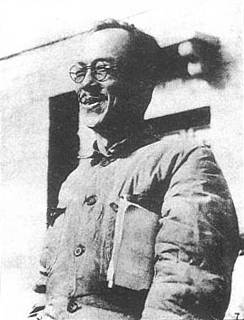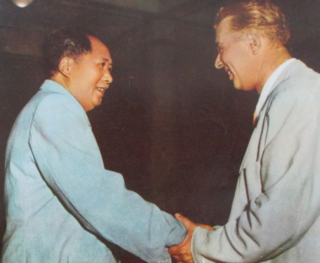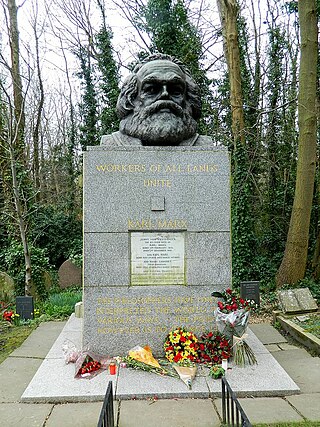Related Research Articles

Leninism is a political ideology developed by Russian Marxist revolutionary Vladimir Lenin that proposes the establishment of the dictatorship of the proletariat led by a revolutionary vanguard party as the political prelude to the establishment of communism. The function of the Leninist vanguard party is to provide the working classes with the political consciousness and revolutionary leadership necessary to depose capitalism.
Marxism–Leninism is a communist ideology that was the predominant branch of the communist movement throughout the 20th century. Developed in Russia by the Bolsheviks, it was the state ideology of the Soviet Union, Soviet satellite states in the Eastern Bloc, and various countries in the Non-Aligned Movement and Third World during the Cold War, as well as the Communist International after Bolshevisation. Today, Marxism–Leninism is the ideology of the ruling parties of China, Cuba, Laos and Vietnam, as well as many other Communist parties. The state ideology of North Korea is derived from Marxism–Leninism. Marxist–Leninist states are commonly referred to as "communist states" by Western academics. Marxist–Leninists reject anarchism and left communism, as well as reformist socialism and social democracy. They oppose fascism and liberal democracy, and are self-proclaimed anti-imperialists. Marxism–Leninism holds that a two-stage communist revolution is needed to replace capitalism. A vanguard party, organized through democratic centralism, would seize power on behalf of the proletariat and establish a one-party socialist state, called the dictatorship of the proletariat. The state would control the means of production, suppress opposition, counter-revolution, and the bourgeoisie, and promote Soviet collectivism, to pave the way for an eventual communist society that would be classless and stateless.

Maoism, officially called Mao Zedong Thought by the Chinese Communist Party (CCP), is a variety of Marxism–Leninism that Mao Zedong developed to realize a socialist revolution in the agricultural, pre-industrial society of the Republic of China and later the People's Republic of China. The philosophical difference between Maoism and traditional Marxism–Leninism is that a united front of progressive forces in class society would lead the revolutionary vanguard in pre-industrial societies rather than communist revolutionaries alone. This updating and adaptation of Marxism–Leninism to Chinese conditions in which revolutionary praxis is primary and ideological orthodoxy is secondary represents urban Marxism–Leninism adapted to pre-industrial China. Later theoreticians expanded on the idea that Mao had adapted Marxism–Leninism to Chinese conditions, arguing that he had in fact updated it fundamentally and that Maoism could be applied universally throughout the world. This ideology is often referred to as Marxism–Leninism–Maoism to distinguish it from the original ideas of Mao.

The Communist International (Comintern), also known as the Third International, was an international organization founded in 1919 that advocated world communism, and which was led and controlled by the Communist Party of the Soviet Union. The Comintern resolved at its Second Congress in 1920 to "struggle by all available means, including armed force, for the overthrow of the international bourgeoisie and the creation of an international Soviet republic as a transition stage to the complete abolition of the state". The Comintern was preceded by the dissolution of the Second International in 1916.

The Sino-Soviet split was the breaking of political relations between the People's Republic of China and the Soviet Union caused by doctrinal divergences that arose from their different interpretations and practical applications of Marxism–Leninism, as influenced by their respective geopolitics during the Cold War of 1947–1991. In the late 1950s and early 1960s, Sino-Soviet debates about the interpretation of orthodox Marxism became specific disputes about the Soviet Union's policies of national de-Stalinization and international peaceful coexistence with the Western Bloc, which Chinese founding father Mao Zedong decried as revisionism. Against that ideological background, China took a belligerent stance towards the Western world, and publicly rejected the Soviet Union's policy of peaceful coexistence between the Western Bloc and Eastern Bloc. In addition, Beijing resented the Soviet Union's growing ties with India due to factors such as the Sino-Indian border dispute, and Moscow feared that Mao was too nonchalant about the horrors of nuclear warfare.

Communist Party USA, officially the Communist Party of the United States of America (CPUSA), also known as the American Communist Party, is a Marxist–Leninist communist party in the United States which was established in 1919 after a split in the Socialist Party of America following the Russian Revolution.

Kang Sheng was a Chinese Communist Party (CCP) official, best known for having overseen the work of the CCP's internal security and intelligence apparatus during the early 1940s and again at the height of the Cultural Revolution in the late 1960s and early 1970s. A member of the CCP from the early 1920s, he spent time in Moscow during the early 1930s, where he learned the methods of the Soviet NKVD and became a supporter of Wang Ming for leadership of the CCP. After returning to China in the late 1930s, Kang Sheng switched his allegiance to Mao Zedong and became a close associate of Mao during the Anti-Japanese War, the Chinese Civil War and after. He remained at or near the pinnacle of power in the People's Republic of China from its establishment in 1949 until his death in 1975. After the death of Chairman Mao and the subsequent arrest of the Gang of Four, Kang Sheng was accused of sharing responsibility with the Gang for the excesses of the Cultural Revolution and in 1980 he was expelled posthumously from the CCP.

Earl Russell Browder was an American politician, spy for the Soviet Union, communist activist and leader of the Communist Party USA (CPUSA). Browder was the General Secretary of the CPUSA during the 1930s and first half of the 1940s.

The Party of Labour of Albania (PLA), also referred to as the Albanian Workers' Party (AWP), was the ruling and sole legal party of Albania during the communist period (1945–1991). It was founded on 8 November 1941 as the Communist Party of Albania but changed its name in 1948. The party was dissolved on 13 June 1991 and succeeded by the Socialist Party of Albania. For most of its existence, the party was dominated by its First Secretary, Enver Hoxha, who was also the de facto leader of Albania.

The Sino-Albanian split was the gradual worsening of relations between the People's Socialist Republic of Albania and the People's Republic of China in the period 1972–1978.
The New Communist movement (NCM) was a diverse left-wing political movement during the 1970s and 1980s. The NCM were a movement of the New Left that represented a diverse grouping of Marxist–Leninists and Maoists inspired by Cuban, Chinese, and Vietnamese revolutions. This movement emphasized opposition to racism and sexism, solidarity with oppressed peoples of the third-world, and the establishment of socialism by popular revolution. The movement, according to historian and NCM activist Max Elbaum, had an estimated 10,000 cadre members at its peak influence.

The Marxist–Leninist Party of Germany is a communist political party in Germany. It was founded in 1982 by members of the Communist Workers Union of Germany and is one of the minor parties in Germany.
Communism is a left-wing to far-left sociopolitical, philosophical, and economic ideology within the socialist movement, whose goal is the creation of a communist society, a socioeconomic order centered around common ownership of the means of production, distribution, and exchange that allocates products to everyone in the society based on need. A communist society would entail the absence of private property and social classes, and ultimately money and the state. Communists often seek a voluntary state of self-governance but disagree on the means to this end. This reflects a distinction between a more libertarian approach of communization, revolutionary spontaneity, and workers' self-management, and a more authoritarian vanguardist or Communist party-driven approach through the development of a constitutional socialist state followed by the withering away of the state. As one of the main ideologies on the political spectrum, communism is placed on the left-wing alongside socialism, and communist parties and movements have been described as radical left or far-left.

The Italian Marxist–Leninist Party is an anti-revisionist Marxist-Leninist communist party in Italy. Founded in Florence in 1977, the leading core of the PMLI began their political activity as they joined the Communist Party of Italy (Marxist–Leninist) in 1967. The group broke away from the PCd'I(ml) in 1969 and formed the Italian Bolshevik Communist Organization Marxist–Leninist. In 1977, the OCBIml was transformed into the PMLI. The current General Secretary is Giovanni Scuderi.
Marxism is a method of socioeconomic analysis that originates in the works of 19th century German philosophers Karl Marx and Friedrich Engels. Marxism analyzes and critiques the development of class society and especially of capitalism as well as the role of class struggles in systemic, economic, social and political change. It frames capitalism through a paradigm of exploitation and analyzes class relations and social conflict using a materialist interpretation of historical development – materialist in the sense that the politics and ideas of an epoch are determined by the way in which material production is carried on.
Communist Party USA (CPUSA) is an American political party with a communist platform that was founded in 1919 in Chicago. The history of the Communist Party USA is deeply rooted in the history of the American labor movement and the Communist Party USA indeed played critical roles in the earliest struggles to organize American workers into unions as well as the later civil rights and anti-war movements. The history of CPUSA is ideologically complex and tied to communism, labor movements, and Marxism. Many party members were forced to work covertly due to the high level of political repression in the United States against Communists. CPUSA faced many challenges in gaining a foothold in the United States as they endured two eras of the Red Scare and never experienced significant electoral success. Despite struggling to become a major electoral player, CPUSA was the most prominent leftist party in the United States. CPUSA developed close ties with the Soviet Union, which led to them being financially linked.
The Workers' Party of New Zealand was a minor political party in New Zealand.

Anti-revisionism is a position within Marxism–Leninism which emerged in the 1950s in opposition to the reforms of Soviet leader Nikita Khrushchev. When Khrushchev pursued an interpretation that differed from his predecessor, Joseph Stalin, anti-revisionists within the international communist movement remained dedicated to Stalin's ideological legacy and criticized the Soviet Union under Khrushchev and his successors as state capitalist and social imperialist. During the Sino-Soviet split, the Communist Party of China, led by Mao Zedong, the Party of Labour of Albania, led by Enver Hoxha, and other parties and organizations around the world denounced the Khrushchev line as revisionist.

Far-left politics in the United Kingdom have existed since at least the 1840s, with the formation of various organisations following ideologies such as Marxism, revolutionary socialism, communism, anarchism and syndicalism.
References
- ↑ Mao Zedong, Refute Right Deviationist Views That Depart From the General Line, June 15, 1953. Online at Marxists.org. Accessed online 2009-10-11.
- ↑ Criticize Rightist Deviationism (1976), ChinesePosters.net, International Institute of Social History. Accessed online 2009-10-11.
- ↑ James Burnham, The Managerial Revolution, Indiana University Press, Bloomingham 1966, p.v.
- ↑ Louis Budenz, Men Without Faces: The Communist Conspiracy in the USA, Harper and Brothers, New York, 1948, pp. 4-5, 55, 68-69, 78-81.
- ↑ Harvey Klehr, John Earl Haynes, and Kyrill M. Anderson, The Soviet World of American Communism, New Haven, CT: Yale University Press, 1998, pp. 71–84.
- ↑ Klehr, Haynes, and Anderson, The Soviet World, pp. 87–88.
- ↑ Jaques Duclos, On the Dissolution of the Communist Party of the United States. Published in Cahiers du Communisme, April 1945. Reprinted in William Z. Foster et al. Marxism-Leninism vs. Revisionism. (New York: New Century Publishers, February 1946), pp. 21-35 in original.
- ↑ Foreign Influence - Weather Underground Organization (WUO). FBI Chicago Field Office Report, August 20, 1976. Section I. Ideology D. Influence of Marxism-Leninism-Mao Tse-tung Thought, Page 57 in original (p. 20 pdf).
- ↑ Paul Costello, U.S. Anti-Revisionism Third Wave, 1960-1970, Encyclopedia of Anti-Revisionism On-Line. Marxist Internet Archive. Retrieved March 16, 2010.
- ↑ Beware Of Deviationist Teachings, Warns Religions Minister Archived 2011-07-07 at the Wayback Machine , 23 October 2002, BruDirect.com; reproduced on bahaindex.com, The Baháʼí Faith Index. Accessed online 2009-10-11.